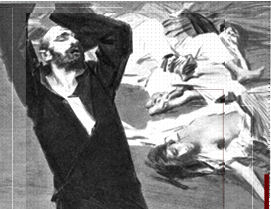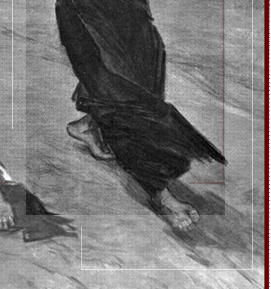KOMITAS
AND THE ARMENIAN GENOCIDE
April 1915 was the beginning of the monstrous
genocide of the Armenians. The Turkish authorities initiated their
long-standing schedule of annihilation of the Armenian nation, and
started their bloody operation with the intellectuals. Two lists
of the banished scientists and artists were made: those who were
included in the first list were to be exiled to Haiash, and the
second group - to Changr. Those who were in the first list were
killed at once. Komitas, together with many friends and colleagues
happened to be included in the second list. The terrible journey
to the place of the exile took them seven weeks. Certainly, from
the very first day, the exiled in this miserable caravan clearly
realized the tragical end that awaited them.
The distinguished Armenian poets Siamanto and
Daniel Varouzhan, who were friends with Komitas while in Constantinople
prison, tried to lavish attentions on him and ease his lot. But
this Calvary route dragging on for months and was fraught with such
awful physical and intellectual shocks anyone could go mad, let
alone a musician who knew no other world but music and songs.
The first shock on Komitas was at the moment when by singing he
tried to make his friends to understand what would be done with
them by those murderers. Suddenly an awful deafening stroke interrupted
his singing: having arisen from behind his back, a beast of a policeman
all of a sudden stunned the Master with a strong blow. Komitas turned
pale and could not move from the unexpected force of the impact.
Once, passing by corpses, skeletons and moans
of dying people Komitas saw a harrowing scene: with improbable,
indescribable pleasure a policeman with a saber disemboweled a young
woman who was in labor. The maiden cry of the new-born child choked
under the Turkish butcher's impact. The infernally excruciating
cries of the mother and son and their dreadful death horrified Komitas
greatly: he again turned awfully pale and lost the ability to speak.
On their way to Changr, on a saddle-point Tavly,
where the caravan of the exiled, tortured by hunger and thirst,
had at last arrived after the exhausting tramp in the desert, there
was another horrifying case. Those who were still vigorous enough
went to look for some drinking water. Komitas, being a thorough
and clean person, was delighted to see the water and clapped his
hands. There were no cups, so they had to drink from the bucket.
Knowing Komitas' meticulousness, Siamanto and Varouzhan first of
all brought the bucket to the Master... But he had hardly come up
to the bucket when the brutal policeman went for him, beat the bucket
out of his hands and threw it away... In horror, Komitas buried
his face in his hands and stiffened numb, while the water dripped
from his dampened clothes.
At last, lowering his hands Komitas with a quenched
look went to his tent. Doctors Torgomian, Ruben Sevak and Kelekian
rushed to find out what had happened to Komitas as his deadly paleness
disturbed everybody... In an hour Komitas joined his friends. Someone
brought water again and gave a cup of water to him. But he refused
and shook his head with a sad smile. He began to speak to himself,
mumbling something. He spent that night restlessly...
The following morning the caravan was ordered
to set off for Changr - a terrible historical Calvary of the Armenian
intellectuals. The caravan drove through a gorge, in the stinging
sun, hungry, tormented with thirst and exhausted. Komitas toiled
hanging his head and muttering something to himself. At that moment
he noticed a dirty, decrepit donkey up the hill ... The Master picked
up the hem of his long robe, shook hands with the donkey, and with
greatest respect bowed to him and cried out loudly, "Do not
hurry, friends, let "chantarma" (policeman) pass!"
Many people took these words for a joke as Komitas had a fine sense
of humor. But Drs. Torgomian and Sevak, being very close friends
to the Master and knowing his spiritual outlook, saw in it some
signs of insanity...
The spiritual state of Komitas was aggravated
after reaching the terrible destination of their "journey"
- Changr, where the prominent figures of the Armenian culture, exhausted
by the mockeries of the Turkish military had already realized completely
that death was breathing in their faces. Having a presentiment of
the end, they asked Komitas to sing for them for the last time.
Komitas did not refuse and performed one of his best-known works
"Have mercy upon me, oh God!"... Accompanied with mournful
cries and hopeless moans of his dying friends, Komitas completed
his song, suddenly burst out laughing madly, his entire body trembling,
horrifying everybody. Perceiving the Master's condition, they surrounded
him and tried to comfort him, but in vain - he went on laughing
madly.
At that fatal time an order was sent from Constantinople
to bring Komitas back. Humble Komitas, accompanied by two of his
escaped friends, Dr.Torgomian and publisher Buzand Kechian, was
brought through Konia to Constantinople after three months' torments.
Here are Komitas' words concerning the events seen and experienced
by him, "A flock without the shepherd lost and knocked down...
Invisible but rough surges shake the miserable history of the life
of my people. The callous hunters have caught the naive fish in
their net. The atmosphere is filled with poison. There is no escape.
Breakup, horror and violence on one hand, and indifference and dirty
hearts on the other hand. Vanity and skill, on one hand, feebleness
and ignorance, on the other hand. Everybody feels his position to
hide ignorance of his mind from a naive eye. Our bodies have rotted,
the souls are desecrated, the life is coated with corpses...
Where is our wise Khorenatsi? Let him rise from the dead, from the
ground impregnated with blood, and mourn over souls and hearts,
minds and deals of our succession. Our ancestors accomplished their
mission with self-sacrifice, and we did it with poverty and misery.
My heart is broken."
After returning from Changr, the narrowly escaped
Komitas and Buzand Kechian were visited by Agavny Mesrobian, a student
of the Master." In the afternoon, - she recalls, - we went
to see the Kechians at their place in Ferideh Street. Just at the
entrance before us there was a harrowing scene: Komitas who looked
very untidy, with an inseparable fan in his hand, was standing surrounded
by the members of the families of the scientists exiled to Changr,
who came to hear from their nearest and dearest. Joining their sobbing,
Komitas excitedly consoled them saying that all their relatives
were safe and sound. "They will return soon just like we did,
- he said scrappily. - Do not be late with the answers to their
letters and cables, be loving wives and mothers"...
Komitas, with the names of the brutally murdered friends on his
lips, damned the savage Turkish government and added: "Ah,
my Kechian, I couldn’t help lying to our widowed sisters."
And throwing himself on Kechian's bed, choking with tears, he went
on, "Nobody knows all the wounds of our national tragedy...
This trouble will drive us mad!"
As the fates decree, it just happened.
Komitas was both an eyewitness and an improbably survived victim
of the Armenian genocide of 1915. This tragedy penetrated all his
further creative work, and the same tragedy predetermined the next
20 years’ awful spiritual sufferings of the gradually dying
away genius of Armenian music.
Visit the official website dedicated to the centennial of the Armenian Genocide!
|

